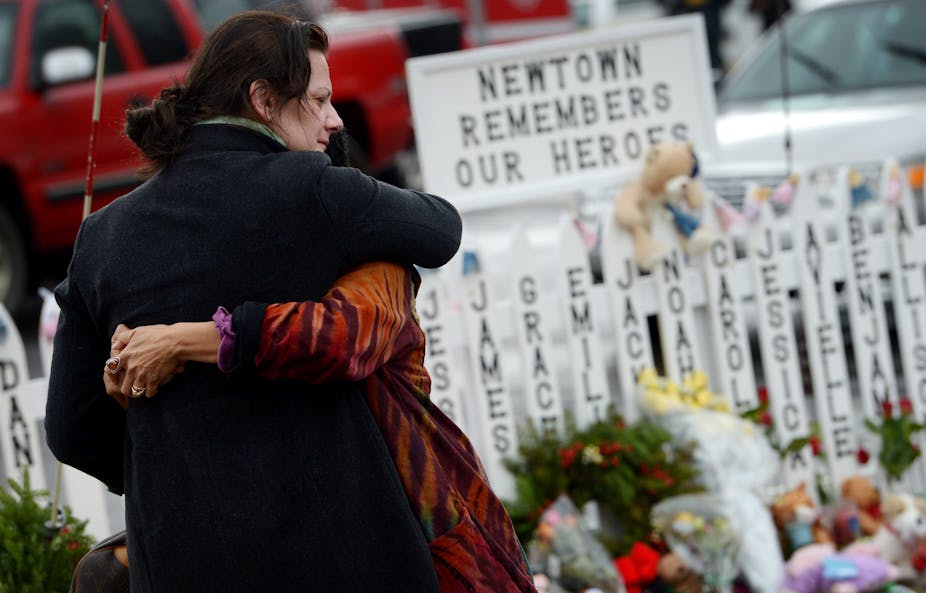It’s easy to bash America.
Externally Americans are often characterised as loud, star-spangled, gun-toting, bible-bashing, right-wing extremists with Fox News continually on in the background and a gas-guzzling Hummer in the driveway.
And the problem is, that when all you ever see are US media reports, politicians, and movies, it is easy to think that’s all America is.
In reality America, like most other countries in the world, is full of people.
People a lot like us. When you meet them, many are very nice, share most of your political views and go about their day-to-day lives doing boring things.
So at this time of tragedy, when a mentally unstable, barely adult male goes into a school and kills 20 young children with a home-grown arsenal, it would be too easy to start lecturing the US about the benefits of Australia’s universal health care scheme, strict gun laws, and a conservative Prime Minister who raised taxes to buy back every assault rifle in the country after our own day of infamy, the Port Arthur massacre.
They don’t need it.
Instead they need our compassion.
Because if the loss of 20 innocent children and six adults can’t change America’s attitude and laws relating to guns, nothing we ever say or do will.
Poissonian Statistics
As an experimental scientist it is hard not to look at the ~300 million guns and ~30,000 gun-related deaths (many of which are suicides) each year in America and not instantly think that every gun has a 0.01% chance of killing someone every year. What we scientists like to call the “expectation value”.
Most guns just sit in cupboards, or get used responsibly, but on rare occasions, they are used in crimes, suicides, shooting accidents or fall into the hands of mentally unstable people who go on killing sprees.
So every gun is an independent test particle that is part of a massive social experiment. On average they kill 0.0001 people every year.
The number of guns, people, social conditions and laws of probability make large numbers of gun-related deaths in the US an inevitability.
Sure the number of deaths varies from year to year, but every weapon and owner is fairly independent of every other one, and so we just get Poisson (random) statistics occurring.
Whenever someone we know is shot, or a horrific mass murder takes place, it makes us think seriously about the issue. When some anonymous teenage kid in Chicago gets his head blown off, we shrug our shoulders and get back to our everyday lives.
Climate Change
There is an eerie parallel between the gun control and climate change debates. Both involve statistics, “evidence” and entrenched positions.
A single record-breaking summer heat wave or extreme hurricane can’t be unambiguously linked to climate change, but their frequency and intensity compared to the historical norm results in statistical arguments prone to interpretation by both sides of the climate change debate.
Proponents of gun control lecture about the inevitability of deaths when guns are easily available and climate change advocates point to the increased risk of extreme weather events in a heated world.
Unfortunately, the world’s climate is an extremely complex mixture of variables, one of which is the atmospheric content of carbon dioxide, or CO2. It results in temperature fluctuations from year to year and place to place.
Today, in Adelaide Australia, it is a beautiful 28 C (82 F), but two days before Christmas it was a very unpleasant 42 C (108 F) and unlike today, I couldn’t help but spend a lot of the day thinking about the world’s CO2 levels.
But it is bad science to take isolated events, like our sweltering late December day, and immediately equate cause (global CO2) and effect (our recent 42C day). In fact, in January 1908 Adelaide had a couple of terrible heat waves that were only eclipsed in 2008, and CO2 was much lower back then.
So on nice days I go about my daily business, driving around my car and planning my next overseas trips and during heat waves I look into solar panels, the cost of hybrid cars and asking myself if a Pro Vice Chancellor has to travel so much?
Like the chance of an individual gun killing someone on any given day, a city’s temperature is unlikely to break any records, so most of the time climate change is out of our minds.
If someone wants to keep their gun, or fly around the world using jet fuel, there are plenty of arguments they can trot out in their defence.
The Sandy Hook massacre was so dreadful that it is likely to permanently change the US’s attitude to gun control that will ultimately save thousands of lives.
Climate change is unlikely to be so lucky.
An individual drought, hurricane or heat wave may affect an individual’s attitude to climate change, but I wonder what climatic event it would take to have the same national impact on policy as the massacre of innocents?

